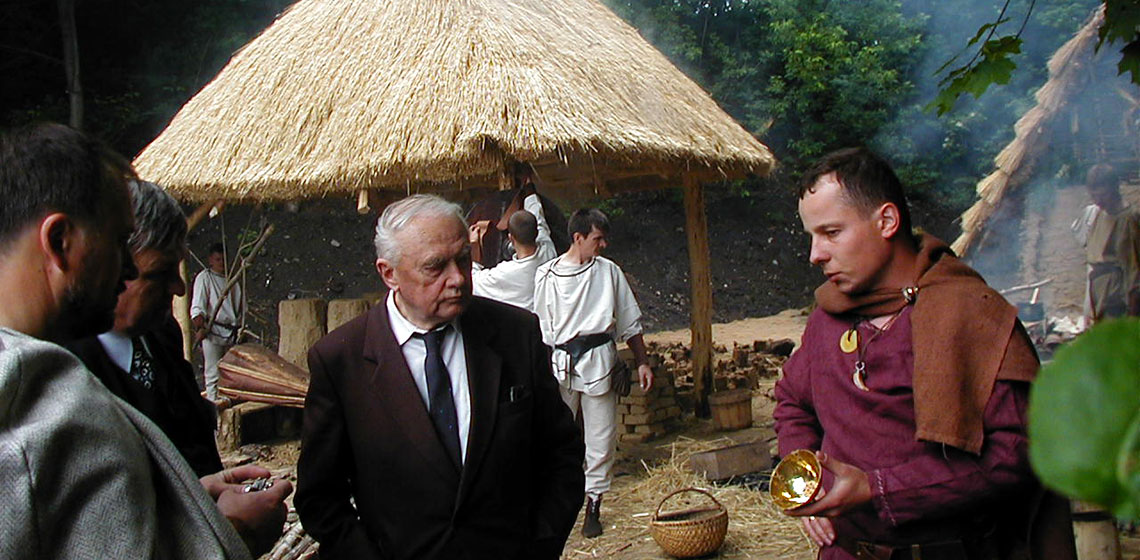The content is published under Creative Commons Attribution 4.0 International license.
Unreviewed Mixed Matters Article:
Obituary: Kazimierz Bielenin (29 January 1923 - 19 November 2011)

On the 19th of November 2011, Prof. dr hab. Kazimierz Bielenin died in Kraków after a long and exhausting illness. He was a great scientist and scholar but also a very modest man with a great personality. He was born on the 29th of January 1923 in Brzeszcze near Oświęcim. He completed his university studies at the Jagiellonian University in Kraków and took the first steps of his professional career at the Nicolaus Copernicus University in Torun.
Photo: Prof. Kazimierz Bielenin during the „Iron Roots” presentation in Starachowice 2004.
All his professional life was connected to the Archaeological Museum in Kraków where he was a deputy director for many years. He was an eminent authority on prehistoric iron metallurgy in Europe and a forerunner in archaeometallurgical studies. His works on ancient metallurgical methods are generally recognised as exemplary. Together with professor M. Radwan, he recognised and introduced into scientific literature the spectacular technological and cultural phenomena of the Roman Empire period in Poland: the ancient metallurgy of the Świętokrzyskie Mountains region. Thanks to his organisational work it is one of the best recognised metallurgical centres in Europe. Although the Świętokrzyskie Mountains were the main focus of his studies, he also carried out long term research in Austria and Germany, with nearly 140 sites studied by him showing the scale of his work. In the history of Polish archaeology it is difficult to find another example of such intensive engagement by one scholar in field archaeology. By employing the then unconventional methods of verbal and written communication with local farmers, within a relatively short time he created an inventory of nearly 6 000 ancient metallurgical sites. He was also one of the first archaeologists in Poland to introduce geophysical survey.
Professor Bielenin’s interests were not restricted to prehistoric archaeology only. In recent years he had turned his attention to a study of modern iron ore mining in the Ostrowiec region, taking the initiative in the documentation and protection of the special industrial heritage of the Świętokrzyskie Mountains region.
The results of his rich editorial work are six books and more than 200 scientific articles published in respected Polish and international journals. As a member of Comité pour la sidérurgie ancienne de l’UISPP he was an organiser and active participant in many international conferences and congresses. He was also active in the museum world, organizing several important international exhibitions which were shown in Germany and Austria.
The International Biographical Centre in Cambridge, UK, presented Professor Bielenin with the prestigious title International Man of the Year 1997 – 1998 in recognition of his services to the field of science.
The professor successfully combined scientific work with active participation in many organisations and societies (Polskie Towarzystwo Prehistoryczne, Comité pour la sidérurgie ancienne de l’UISPP, The Historical Metallurggy Soc. Coleford, London, Komisja Archeologiczna Oddziału PAN w Krakowie, Stowarzyszenie Miłośników Tradycji Mazurka Dąbrowskiego). From the end of the 1960’s he also took part in Kielce scientific organisations. For more than 40 years he was an active member of Towarzystwo Przyjaciół Górnictwa, Hutnictwa i Przemysłu Staropolskiego in Kielce and Świętokrzyskie Stowarzyszenie Dziedzictwa Przemysłowego where he was a chairman of the scientific board. Professor Bielenin was very active in the field of archaeology popularisation. From 1967 to 1998 he directed a programme of experimental research on iron smelting in ancient furnaces. Thanks to this initiative ancient metallurgy became an attraction of the Kielce region and one of the best studied and recognized scientific subjects in that region.
The social involvement of the professor should also be mentioned. He received many awards and medals including the Krzyż Komandorski Orderu Odrodzenia Polski. One of the most spectacular results of this work was the building of a mound to the general Jan Henryk Dąbrowski in Pierzchowo. In his last years he dedicated much energy into searching for the bells from his native Brzeszcze, which had been looted by Germans. Thanks to his energy and dedication they were successfully repatriated and now hang in the towers of St Otylia in Brzeszcze.
The demise of Professor Bielenin will not mean an end to his work. This will be continued by the co-workers he gathered and infused with his passion, who are a rare example of multigenerational continuation in science, a strong foundation of which are true friendship and understanding.
Keywords
Country
- Poland

